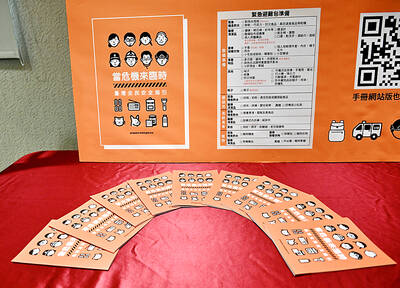The purpose of national defense is to safeguard national security and uphold world peace, and the military fights for the safety of Taiwanese, President William Lai (賴清德) said last night.
Lai delivered his fourth speech in a series of 10 last night at the Lions Clubs International District 300 A1 in Taipei.
Lai began the speech about national defense by quoting the Constitution, saying that national defense is meant to safeguard national security, not to invade another country.

Photo: screen grab from a Presidential Office livestream
The army, air force and navy must be above any personal, regional and partisan interests, pledging loyalty to the nation and to protect the people, Lai said.
“The military fights for the survival and development of the Republic of China, and for the safety of the people of Taiwan [proper], Penghu, Matsu and Kinmen,” he said.
Citing the 1949 Battle of Guningtou and the 1958 Taiwan Strait Crisis as examples, Lai said that the military fought bravely to defend the nation and demonstrated military-civilian cooperation.
Whenever Taiwanese society faces disasters or pandemics, the military plays a crucial role in recovery and restoration, he said.
China’s military budget, which has been rising continuously since 2000 and surpassed NT$8 trillion (US$274.1 billion) this year, is more than seven times what it was 20 years ago, he said.
Its budget did not stop rising even when the Chinese Nationalist Party (KMT) was in power, he added.
China’s threat is not directed at Taiwan alone, but has already pushed its aggression beyond the first and second island chains to the third island chain, aiming to reshape the international order and dominate the Western Pacific, he said.
“China would not stop even if it annexed Taiwan. It would only pursue regional expansion with even more force,” he said.
During former president Ma Ying-jeou’s (馬英九) administration, Taiwan’s national defense budget decreased, shrinking to about 2 percent of GDP, Lai said.
During former president Tsai Ing-wen’s (蔡英文) administration, the budget increased by 80.74 percent from NT$359.6 billion in 2016 to NT$606.8 billion last year, reaching about 2.5 percent of GDP, he said.
Lai said that he promised to increase national defense spending to at least 3 percent of GDP this year to demonstrate Taiwan’s determination to protect itself.

One of two tropical depressions that formed off Taiwan yesterday morning could turn into a moderate typhoon by the weekend, the Central Weather Administration (CWA) said yesterday. Tropical Depression No. 21 formed at 8am about 1,850km off the southeast coast, CWA forecaster Lee Meng-hsuan (李孟軒) said. The weather system is expected to move northwest as it builds momentum, possibly intensifying this weekend into a typhoon, which would be called Mitag, Lee said. The radius of the storm is expected to reach almost 200km, she said. It is forecast to approach the southeast of Taiwan on Monday next week and pass through the Bashi Channel

NO CHANGE: The TRA makes clear that the US does not consider the status of Taiwan to have been determined by WWII-era documents, a former AIT deputy director said The American Institute in Taiwan’s (AIT) comments that World War-II era documents do not determine Taiwan’s political status accurately conveyed the US’ stance, the US Department of State said. An AIT spokesperson on Saturday said that a Chinese official mischaracterized World War II-era documents as stating that Taiwan was ceded to the China. The remarks from the US’ de facto embassy in Taiwan drew criticism from the Ma Ying-jeou Foundation, whose director said the comments put Taiwan in danger. The Chinese-language United Daily News yesterday reported that a US State Department spokesperson confirmed the AIT’s position. They added that the US would continue to

The number of Chinese spouses applying for dependent residency as well as long-term residency in Taiwan has decreased, the Mainland Affairs Council said yesterday, adding that the reduction of Chinese spouses staying or living in Taiwan is only one facet reflecting the general decrease in the number of people willing to get married in Taiwan. The number of Chinese spouses applying for dependent residency last year was 7,123, down by 2,931, or 29.15 percent, from the previous year. The same census showed that the number of Chinese spouses applying for long-term residency and receiving approval last year stood at 2,973, down 1,520,

EASING ANXIETY: The new guide includes a section encouraging people to discuss the threat of war with their children and teach them how to recognize disinformation The Ministry of National Defense’s All-Out Defense Mobilization Agency yesterday released its updated civil defense handbook, which defines the types of potential military aggression by an “enemy state” and self-protection tips in such scenarios. The agency has released three editions of the handbook since 2022, covering information from the preparation of go-bags to survival tips during natural disasters and war. Compared with the previous edition, released in 2023, the latest version has a clearer focus on wartime scenarios. It includes a section outlining six types of potential military threats Taiwan could face, including destruction of critical infrastructure and most undersea cables, resulting in